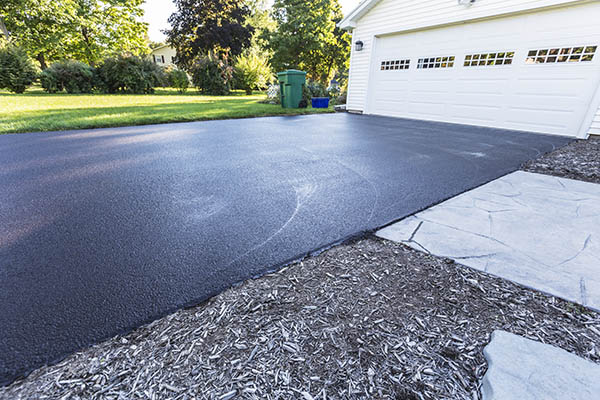Unleash the Possible: Regrading and Asphalt Sealing for Business Rooms
Unleash the Possible: Regrading and Asphalt Sealing for Business Rooms
Blog Article
Warm Mix Asphalt: A Sustainable Option for Pavement
Warm Mix Asphalt (HMA) has emerged as a leading sustainable choice for pavement services, using a myriad of innovative innovations and ecological advantages. Its capability to minimize and reuse products energy intake provides an engaging case for its adoption in road building and construction jobs. The long-lasting performance and durability of HMA make it a favored choice for infrastructure advancement. As the need for green construction methods grows, checking out the nuances of HMA's sustainability can give valuable understandings right into the future of pavement services.
Ecological Benefits of Warm Mix Asphalt

Additionally, Hot Mix Asphalt aids to reduce metropolitan warm island effects. Its dark shade absorbs sunshine, lowering the quantity of warmth mirrored back right into the environment compared to lighter-colored pavements. This can lower ambient temperatures in metropolitan locations, reducing the need for a/c and ultimately minimizing energy consumption.
On top of that, Warm Mix Asphalt contributes to improved stormwater management. Its porous nature allows water to charge and infiltrate the pavement groundwater supplies, reducing runoff and the risk of flooding. These ecological advantages make Warm Mix Asphalt a lasting choice for leading roadways and freeways.
Energy Performance in HMA Production
Is power effectiveness a critical consider the manufacturing of Hot Mix Asphalt (HMA)? Definitely. Power plays a considerable role in the manufacturing of HMA, impacting both cost and ecological sustainability. One crucial facet of energy performance in HMA production is using warm mix asphalt (WMA) technologies (angled parking). WMA allows for the mixing and positioning of asphalt at reduced temperature levels contrasted to traditional warm mix asphalt, leading to lowered power usage throughout production. This process not only lowers fuel usage yet also lowers greenhouse gas discharges, making it an extra eco-friendly alternative.
Additionally, developments in plant innovations have caused even more energy-efficient HMA production processes. Modern plants are made with features like recycled asphalt pavement (RAP) handling capacities, effective burner systems, and enhanced insulation, all adding to energy financial savings. By maximizing energy use in HMA production, the market can decrease its carbon footprint while preserving premium sidewalk products. Energy efficiency is, as a result, an important consideration in making sure the sustainability of Warm Mix Asphalt production.
Recyclability of Warm Mix Asphalt
The recyclability of Warm Mix Asphalt (HMA) is an essential facet of its sustainability and long-term environmental effect. HMA is just one of one of the most recycled materials in the USA, with over 100 million bunches of reclaimed asphalt sidewalk (RAP) being reused annually in new sidewalk construction. Recycling HMA provides a number of ecological advantages, such as minimizing the demand for virgin products, lowering energy consumption during manufacturing, and lowering the quantity of waste sent out to land fills.
The process of recycling HMA includes grating the existing sidewalk, squashing it right into smaller look at this site sized pieces, and blending it with brand-new accumulation and asphalt binder to create a recycled mix. This recycled mix can typically carry out along with or also far better than standard HMA, while calling for less basic materials and creating lower greenhouse gas emissions. By incorporating RAP into brand-new pavement jobs, roadway companies can save natural resources, decrease expenses, and reduce the environmental impact of roadway building and construction and upkeep tasks. On the whole, the recyclability of HMA plays a significant duty in advertising sustainable techniques within the sidewalk market.

Long-Term Efficiency of HMA
Asphalt sidewalks demonstrate resilience and strength over an extended duration, showing the long-term performance of Warm Mix link Asphalt (HMA) Additionally, innovations in HMA technology, such as the usage of polymer-modified binders and warm mix asphalt, have actually even more boosted the resilience and durability of HMA pavements. By focusing on top quality building and upkeep practices, HMA continues to verify itself as a cost-efficient and sustainable service for resilient sidewalk facilities.

HMA: Sturdiness and Sustainability
Demonstrating both resilience and sustainability, Hot Mix Asphalt (HMA) has actually become a keystone in the building of long-lasting sidewalk infrastructures - hot mix asphalt. HMA's toughness stems from its capacity to endure hefty loads, severe weather conditions, and high website traffic volumes, making it a dependable option for highways, highways, and airport terminal runways. The make-up of HMA, which generally consists of aggregates, binder, and filler, plays an important role in boosting its longevity and resistance to tear and put on
Furthermore, HMA's sustainability depends on its recyclability and energy-efficient manufacturing procedure. The capability to recycle reclaimed asphalt pavement (RAP) in brand-new HMA mixes lowers the need for virgin materials and decreases the ecological influence of pavement building and upkeep. Furthermore, the power effectiveness of creating HMA hinges on its lower mixing temperature levels compared to various basics other pavement products, resulting in reduced energy usage and greenhouse gas discharges.
Conclusion
In final thought, warm mix asphalt (HMA) offers a sustainable service for pavement with its ecologically friendly attributes. HMA's recyclability, energy effectiveness in manufacturing, and lasting sturdiness make it an eco-friendly choice for roadway building and construction.
HMA is one of the most recycled products in the United States, with over 100 million loads of redeemed asphalt pavement (RAP) being recycled each year in new sidewalk building.The process of recycling HMA involves milling the existing sidewalk, crushing it right into smaller sized pieces, and mixing it with new accumulation and asphalt binder to produce a recycled mix.Asphalt pavements demonstrate durability and strength over an extensive duration, reflecting the lasting performance of Hot Mix Asphalt (HMA) In addition, innovations in HMA modern technology, such as the usage of polymer-modified binders and warm mix asphalt, have additionally improved the durability and durability of HMA pavements. The capability to recycle reclaimed asphalt pavement (RAP) in brand-new HMA mixtures minimizes the demand for virgin products and minimizes the ecological impact of sidewalk building and maintenance.
Report this page